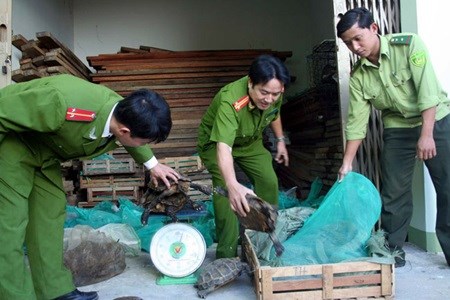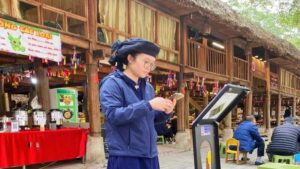Viet Nam was identified as a transshipment point for international wildlife trafficking rings from Africa, primarily in Mozambique, Kenya and Tanzania, during a multilateral dialogue in Ha Noi on November 3.

The Quang Nam Province Police check wild turtles being confiscated in Binh Nguyen Commune, Thang Binh District.(Source: VNA)
Participants from the four countries convened to discuss ways to combat wildlife trafficking, especially the sale of ivory and rhino horns, according to Ha Thi Tuyet Nga, Director of the Viet Nam Convention on International Trade in Endangered Species of Wild Fauna and Flora (CITES) Management Authority.
Multilateral cooperation was expected to play a major role in efforts to prevent wildlife trafficking in the four countries, she said.
Le Duy Dong, Deputy Head of the Interpol Viet Nam Office under the Ministry of Public Security, said the ministry worked with African countries from 2010-14 to handle 18 trans-national wildlife trafficking cases, including three involving Mozambique, two involving Kenya and two involving Tanzania.
Statistics from the Ministry of Public Security estimated that about 4,000-4,500 tonnes of wildlife products are illegally trafficked each year into Vietnam.
"The numbers show signs of increasing crime, despite efforts from local managerial agencies," Dong said.
Dong suggested that Vietnam sign international agreements, especially with African countries, to prevent wildlife trafficking crimes in the future.
A representative from Tanzania said the lack of cooperative agreements between Tanzania and Viet Nam made it difficult for Tanzanian authorities to handle wildlife trafficking cases.
He said the Vietnamese Customs agency identified a wildlife trafficker suspected of illegally smuggling goods from Tanzania in September 2014, but the information was not passed along to Tanzania until January 2015.
A representative from Kenya, where the illegal poaching of rhinos for their horns causes headaches for managerial agencies, said bilateral and multilateral cooperation was vital to reduce wildlife trafficking crimes.
















